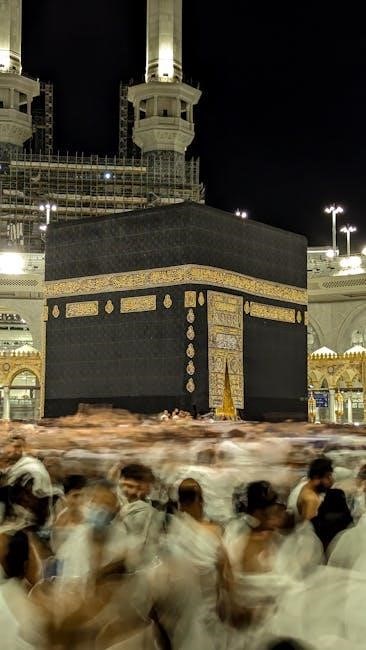Tawaf is a sacred Islamic ritual involving seven circumambulations around the Kabah, reflecting deep spiritual connection and devotion. Each round is accompanied by specific supplications, enhancing worship.
Overview of Tawaf in Islamic Rituals
Tawaf is a fundamental Islamic ritual performed during Umrah and Hajj, involving seven circumambulations around the Kabah in Makkah. It symbolizes unity, devotion, and remembrance of Allah. Pilgrims begin at the Hajar Al-Aswad, the sacred black stone, and complete seven rounds while reciting specific supplications. Each round is accompanied by duas, such as “Rabbana Atina Fid-Dunya” and prayers for forgiveness, blessings, and salvation. Tawaf is performed in a state of Ihram, emphasizing purity and focus. It is a physical and spiritual act, reflecting submission to Allah and connection to Islamic traditions. The ritual is integral to Islamic pilgrimage, fostering a sense of community and spiritual renewal among believers.
Importance of Performing Tawaf with Proper Intention
Performing Tawaf with a sincere and proper intention is crucial for its acceptance. A pilgrim must intend to seek Allah’s pleasure and spiritual closeness. The intention should be pure, focusing on worship rather than worldly gain. This mindset ensures that the act is not merely physical but deeply spiritual. Proper intention aligns the heart and actions, making Tawaf a meaningful experience. It also reflects the Islamic emphasis on sincerity in all acts of worship. By starting Tawaf with a clear intention, pilgrims demonstrate their devotion and commitment to faith, enhancing the ritual’s spiritual significance and personal transformation.

Preparation for Tawaf
Preparation involves wearing Ihram, performing Wudu, and making proper intention. Pilgrims ensure purity of body and mind, readying themselves for this sacred ritual.
Wearing Ihram: Rules and Significance
Wearing Ihram is a crucial step in preparing for Tawaf, symbolizing equality and humility before Allah. It involves draping two white, unstitched pieces of cloth for men, while women wear modest attire. The Ihram must be worn under the right armpit and over the left shoulder during all seven rounds of Tawaf. This attire is not just a tradition but a spiritual practice that reminds pilgrims to shed worldly distractions and focus on their devotion; The rules ensure uniformity and equality among all worshippers, emphasizing the unity of purpose and faith during the sacred ritual.
Performing Wudu Before Tawaf
Performing Wudu (ablution) is a prerequisite for Tawaf, ensuring a state of physical and spiritual purity. It involves washing the face, arms, head, and feet according to Islamic guidelines. Wudu cleanses the body and soul, preparing the worshipper for the sacred ritual. It is essential to perform Wudu before starting Tawaf to maintain the sanctity of the act. The process reflects the importance of cleanliness in Islam and serves as a reminder of the need for inner purity. By performing Wudu, pilgrims demonstrate their commitment to following Islamic teachings and approach Tawaf with the required focus and sincerity. This act is a fundamental step in the preparation for the spiritual journey of circumambulating the Kabah.
Understanding the Starting Point (Hajar Al-Aswad)
Hajar Al-Aswad, the Black Stone, is the sacred starting point of Tawaf. It is set in the eastern corner of the Kabah and holds immense religious significance. Pilgrims begin their circumambulation by facing and kissing the stone, a tradition traced back to the Prophet Muhammad (peace be upon him). The act symbolizes the acceptance of one’s prayers and serves as a connection to the divine. The stone is believed to possess blessings and is a focal point of unity for Muslims worldwide. The starting point is crucial as it aligns the worshippers’ direction and intention, ensuring the Tawaf is performed correctly. Kissing the stone is a gesture of respect and devotion, marking the commencement of the sacred ritual.

The Seven Rounds of Tawaf
Tawaf consists of seven circumambulations around the Kabah, each with designated supplications; The rounds symbolize unity, devotion, and a spiritual journey, connecting worshippers to divine mercy.
Round 1: Intention and Initial Supplication
Round 1 of Tawaf begins with a heartfelt intention, seeking divine acceptance and ease in performing the ritual. Pilgrims face the Hajar Al-Aswad, raise their hands, and recite the initial supplication: “Allahu Akbar” (God is the Greatest). This round sets the tone for spiritual reflection, emphasizing humility and devotion. The supplication is a plea for guidance, forgiveness, and blessings, reflecting the believer’s commitment to worship. The act of circling the Kabah symbolizes unity with all worshippers and a deep connection to Islamic traditions. This first round is a powerful reminder of the sacredness of the moment and the importance of sincerity in worship.
Round 2: Reciting the Fatiha and Ikhlas
During the second round of Tawaf, worshippers recite the Holy Quran’s Surah Al-Fatihah and Surah Al-Ikhlas. These recitations are deeply symbolic, emphasizing divine guidance and the oneness of God. Al-Fatihah, the “Mother of the Quran,” is a prayer for direction and mercy, while Al-Ikhlas reinforces the belief in God’s unity and sincerity. This round highlights the importance of combining physical movement with spiritual focus, ensuring that the heart remains engaged in worship. The recitations are meant to strengthen the connection with Allah, fostering humility and devotion. This practice also reflects the Prophet’s teachings on the significance of these surahs in Tawaf, making it a vital part of the ritual’s spiritual essence.
Round 3: Dua for Forgiveness and Mercy
In the third round of Tawaf, the focus shifts to seeking divine forgiveness and mercy. Worshippers recite specific supplications, imploring Allah for pardon and compassion. This round is a poignant reminder of human imperfection and the need for spiritual cleansing. The duas emphasize humility and the acknowledgment of one’s shortcomings, fostering a deeper sense of repentance. By seeking mercy, the believer strengthens their relationship with Allah, aligning their heart with the purpose of the pilgrimage. This round is also a moment to reflect on past actions and resolve to live a more righteous life, embodying the spirit of Tawaf as a journey of both body and soul;
Round 4: Seeking Blessings in This World and the Next
In the fourth round of Tawaf, the focus is on supplicating for blessings in both this worldly life and the hereafter. Worshippers recite the dua, Rabbana atina fid-dunya hasanatan wa fil akhirati hasanatan wa qina adhaban-nar, which translates to, “Our Lord, grant us good in this world and good in the next and protect us from the torment of the Fire.” This round emphasizes the balance between seeking worldly success and spiritual growth. It is a moment to reflect on one’s desires and align them with divine will, fostering gratitude and trust in Allah’s provisions. The supplication underscores the believer’s reliance on Allah for all blessings and protection from harm in both realms of existence.
Round 5: Supplication for Guidance and Protection
In the fifth round of Tawaf, worshippers focus on seeking divine guidance and protection. The recommended supplication emphasizes humbly asking Allah for direction and safeguarding from harm. This round highlights the believer’s reliance on Allah’s mercy and wisdom, fostering a deeper sense of humility and faith. The supplication also serves as a reminder of the importance of maintaining a righteous path in life and seeking Allah’s assistance in overcoming challenges. Worshippers are encouraged to reflect on their spiritual journey and express gratitude for Allah’s continuous protection and guidance in all aspects of life.
Round 6: Dua for Salvation from the Fire
The sixth round of Tawaf is dedicated to seeking salvation from the Fire, emphasizing the believer’s humility and fear of divine accountability. Worshippers recite a supplication asking Allah for blessings in this life and the next, while pleading for protection from the torment of Hell. This round serves as a poignant reminder of the consequences of sin and the importance of seeking Allah’s mercy. The supplication is a heartfelt plea for divine forgiveness and safety, reflecting the Prophet’s teachings on the significance of fearing Allah’s judgment. This round deepens the worshipper’s awareness of their accountability and strengthens their resolve to lead a righteous life, seeking Allah’s compassion and salvation. The supplication also underscores the belief in the Hereafter and the eternal consequences of one’s actions. By focusing on this prayer, worshippers reaffirm their commitment to seeking Allah’s grace and avoiding His displeasure, while expressing gratitude for His boundless mercy and forgiveness. This supplication is a powerful expression of devotion, highlighting the importance of seeking divine protection and guidance in both worldly and spiritual matters. It serves as a reminder to remain mindful of Allah’s presence in all aspects of life and to continually strive for moral and spiritual growth. The supplication’s emphasis on seeking blessings in this life and the next aligns with the Islamic teachings of balancing worldly responsibilities with spiritual aspirations, ensuring a holistic approach to faith and worship. Through this prayer, believers not only seek refuge from the Fire but also express their hope for divine mercy and eternal peace. This round is a profound moment of spiritual reflection, encouraging worshippers to evaluate their deeds and seek Allah’s forgiveness with sincerity and humility. By invoking Allah’s mercy, believers reinforce their trust in His wisdom and justice, acknowledging His power to grant salvation and guidance to those who seek it with genuine faith and devotion. This supplication, therefore, plays a vital role in strengthening the worshipper’s spiritual foundation and deepening their connection with Allah during the sacred ritual of Tawaf.
Round 7: Final Supplication for Completion
The seventh round concludes the Tawaf ritual, marking its completion. Upon finishing the seventh circumambulation, worshippers face the Hajar Al-Aswad and perform the final supplication. This prayer is a heartfelt expression of gratitude to Allah for enabling the completion of Tawaf; Worshippers recite phrases such as “Bismillahi Allahu Akbar Wa Lillah Hil Hamd,” glorifying Allah and acknowledging His greatness. This moment signifies the fulfillment of a sacred obligation and serves as a reminder of Allah’s blessings. The final supplication is a sincere request for acceptance of the Tawaf and for Allah’s continued guidance and mercy. It encapsulates the worshipper’s commitment to faith and their hope for divine acceptance. This concluding prayer strengthens the spiritual connection established during Tawaf, leaving the believer with a sense of accomplishment and renewed devotion. The completion of Tawaf is thus marked with humility, gratitude, and a deep sense of spiritual fulfillment, as the worshipper seeks Allah’s pleasure and blessings in all aspects of life. This final supplication is a poignant culmination of the Tawaf ritual, reinforcing the believer’s faith and their eternal bond with Allah. Through this prayer, the worshipper seeks not only the acceptance of their ritual but also divine mercy and protection in their journey through life and the Hereafter. The seventh round, therefore, serves as a powerful conclusion to the Tawaf, leaving a lasting impression of spiritual renewal and divine connection. The final supplication is a testament to the profound significance of Tawaf as a means of drawing closer to Allah and seeking His eternal blessings. It is a moment of profound reflection and sincere devotion, encapsulating the essence of Islamic worship and the believer’s unwavering commitment to their faith.

Duas and Supplications for Each Round
Tawaf involves specific supplications for each round, fostering a deeper spiritual experience. Recite duas like “Rabbana Atina Fid-Dunya” with sincerity, following the Prophet’s (PBUH) teachings.
Dua at the Yamani Corner
At the Yamani Corner, pilgrims are encouraged to recite specific supplications, such as “Rabbana Atina Fid-Dunya Hasana Fil Hayatid Dunya, Wa Hasana Fil Hayatil Akhirah”, seeking blessings and mercy. This dua emphasizes gratitude and the desire for a righteous life in both worlds. It is recommended to recite this prayer with genuine intention and focus, as each corner of the Kabah holds spiritual significance. The Yamani Corner is particularly notable, and these supplications are a means of connecting with Allah’s divine grace during the Tawaf ritual.
Reciting “Rabbana Atina Fid-Dunya”
The supplication “Rabbana Atina Fid-Dunya Hasanah, Wa Fil Akhirati Hasanah, Wa Qina Adhaban-Nar” is a heartfelt prayer recited during Tawaf. It translates to, “Our Lord, grant us good in this world and good in the Hereafter, and protect us from the torment of the Fire.” This dua reflects a believer’s desire for blessings in both worldly and spiritual aspects of life. It is recommended to recite this prayer with sincerity, particularly during the circumambulation, as it aligns with the spirit of seeking divine mercy and grace. This supplication is a powerful way to connect with Allah and express gratitude while performing the sacred ritual of Tawaf.
Supplication While Kissing the Hajar Al-Aswad
Kissing the Hajar Al-Aswad is a symbolic act of devotion during Tawaf, often accompanied by the supplication: “Bismillahi Allahu Akbar Wa Lillah Hil Hamd” (In the name of Allah, Allah is the Greatest, and all praise belongs to Allah). This act signifies renewal of one’s covenant with Allah and expresses humility; The supplication is recited with sincerity, acknowledging Allah’s greatness and seeking His mercy. The Hajar Al-Aswad, believed to be a heavenly stone, is a sacred relic, and kissing it is a profound moment of spiritual connection. This act is performed at the start and end of Tawaf, emphasizing the seeker’s devotion and submission to Allah’s will;
Completing Tawaf
After completing seven rounds, the pilgrim performs Istilam of Hajar Al-Aswad, reciting “Bismillahi Allahu Akbar Wa Lillah Hil Hamd”, marking the end of Tawaf with gratitude and devotion.
Istilam of Hajar Al-Aswad After Seven Rounds
After completing the seven rounds of Tawaf, pilgrims perform the Istilam of Hajar Al-Aswad, a sacred ritual symbolizing the completion of circumambulation. This involves kissing or touching the Black Stone, a gesture of deep reverence and submission to Allah. The pilgrim recites the dua: “Bismillahi Allahu Akbar Wa Lillah Hil Hamd” (In the name of Allah, Allah is the Greatest, and all praise is for Allah). This act marks the fulfillment of Tawaf and expresses gratitude for the opportunity to perform this sacred ritual. The Istilam is a poignant moment, reflecting spiritual connection and humility before the Almighty.
Final Dua Upon Completion
Upon finishing the seven rounds of Tawaf, pilgrims recite a final dua to mark the completion of this sacred ritual. The recommended supplication is: “Bismillahi Allahu Akbar Wa Lillah Hil Hamd” (In the name of Allah, Allah is the Greatest, and all praise is for Allah). This dua expresses gratitude for completing Tawaf and acknowledges Allah’s greatness. After this, pilgrims often engage in personal supplications, seeking blessings, forgiveness, and guidance. The final dua signifies the culmination of the Tawaf ritual and serves as a moment of profound spiritual reflection and connection with the Divine. It is a time to reflect on the journey and seek Allah’s mercy and blessings.
Additional Rituals After Tawaf
After completing Tawaf, pilgrims proceed to Saee, running between Safa and Marwah, commemorating Hagar’s search for water. This ritual symbolizes perseverance and trust in divine providence.
Performing Saee (Running Between Safa and Marwah)
After completing Tawaf, pilgrims proceed to perform Saee, a ritual that involves running or walking between the hills of Safa and Marwah seven times. This act commemorates the search of Hagar, the wife of Prophet Ibrahim, for water in the desert. Pilgrims start at Safa, then run or walk to Marwah, and repeat this process, ensuring they complete seven rounds. During Saee, it is recommended to recite supplications and reflect on the divine blessings. Maintaining the state of Ihram is essential, and the ritual must be performed with sincerity and focus. Saee symbolizes trust in Allah’s providence and is a vital component of the Umrah and Hajj rituals.
Importance of Maintaining Focus and Sincerity
Maintaining focus and sincerity during Tawaf is crucial, as it ensures the ritual’s spiritual significance is fully realized. Tawaf is not merely a physical act but a profound expression of devotion and connection with Allah. Pilgrims must minimize distractions, keeping their heart and mind engaged in the act of worship. Sincerity in intention and action is essential, as Allah accepts deeds based on their purity. By staying focused, pilgrims can fully immerse themselves in the supplications and reflections that accompany each round, enhancing the spiritual benefits of Tawaf. This mindfulness also fosters a deeper sense of humility and gratitude, aligning with the true purpose of this sacred ritual.

Common Mistakes to Avoid During Tawaf
Common mistakes during Tawaf include forgetting to recite supplications, not maintaining the proper state of Ihram, and losing focus, which can impact the ritual’s validity and spiritual significance.
Forgetting to Recite Supplications
Forgetting to recite supplications during Tawaf is a common mistake that can diminish the spiritual benefits of the ritual. Each round of Tawaf is accompanied by specific duas, such as the recitation of the Fatiha, Ikhlas, and prayers for forgiveness and mercy. Neglecting these supplications can lead to an incomplete or less rewarding experience. Many pilgrims, especially those performing Tawaf for the first time, may overlook the importance of reciting these prayers, particularly during the Yamani corner and the sixth round, where specific supplications are recommended. To avoid this, it is advisable to memorize the key supplications or carry a guide to ensure all prayers are recited appropriately during the seven rounds.
Not Maintaining the Proper State of Ihram
Not maintaining the proper state of Ihram is a significant mistake during Tawaf. Ihram requires wearing the designated attire correctly, with the right shoulder uncovered and the left shoulder covered. Many pilgrims inadvertently violate this by improperly draping the Ihram cloth or covering their heads, which is prohibited. Additionally, actions such as trimming nails, shaving, or wearing perfumes while in Ihram can invalidate the ritual. It is crucial to adhere strictly to the rules of Ihram, as any violation may necessitate offering a sacrifice or repeating the ritual. Pilgrims should ensure they are well-informed about Ihram regulations to avoid such errors and maintain the sanctity of their Tawaf.

Frequently Asked Questions
Common inquiries include whether women can perform Tawaf alongside men and what to do if a round or supplication is forgotten. Answers provide clarity and reassurance.
Can Women Perform Tawaf with Men?
Women are permitted to perform Tawaf alongside men, though maintaining modesty and proper etiquette is essential. Islamic teachings emphasize equality in worship, ensuring all can participate in this sacred ritual.
What If One Forgets a Round or Supplication?
Forgetting a round or supplication during Tawaf does not invalidate the ritual. Pilgrims should complete the remaining rounds and, if possible, return to make up any missed supplications afterwards.
Tawaf embodies profound spiritual renewal, fostering a deeper connection with the Divine; Performing it with sincere devotion enhances its blessings and significance in one’s faith journey.
Summarizing the Spiritual Benefits of Tawaf
Tawaf is a transformative ritual that strengthens one’s faith and connection to Allah. Each of the seven rounds offers unique spiritual blessings, fostering humility and gratitude. It provides an opportunity to seek forgiveness, guidance, and blessings in this life and the next. The supplications recited during Tawaf, such as “Rabbana Atina Fid-Dunya” and prayers for salvation from the Fire, reflect a deep desire for divine mercy and grace. By focusing on these duas, believers can cultivate self-reflection and devotion, ultimately enriching their spiritual journey. Tawaf also symbolizes unity among believers, as millions gather with a shared purpose, embodying the essence of Islamic worship and submission to Allah’s will.
Encouragement to Perform Tawaf with Devotion
Engaging in Tawaf with sincerity and focus amplifies its spiritual impact, allowing believers to fully embrace its blessings. Each round presents an opportunity to reconnect with divine grace, fostering a deeper sense of purpose and humility. Reciting the recommended supplications, such as those for forgiveness and mercy, enriches the experience, making it a powerful means of seeking Allah’s favor. By maintaining the proper state of Ihram and intention, worshipers can ensure their Tawaf is both valid and meaningful. Embracing this sacred ritual with heartfelt devotion not only enhances personal spirituality but also strengthens one’s commitment to faith, making the journey to the Kabah truly transformative and fulfilling.
